Are you a parent, guardian, or educator of children who find it tough to handle losing in board games? Look no further! Our board game review is here to assist you in finding the perfect games that encourage fun, learning, and teamwork, without the distress of losing.
Discover exciting titles that encourage collaboration and teamwork while maintaining a sense of fairness and shared victories. Additionally, explore competitive games that promote strategic thinking and creativity, allowing children to learn the value of both winning and losing in a supportive environment. With our recommendations, you can ensure that game time is a fulfilling experience for every child, where the journey is as enriching as the destination. So, let’s dive into a world of board games that both nurture and challenge young minds, creating memorable moments and learning opportunities that go beyond the final score.
Cooperative games
1. Hoot Owl Hoot!:
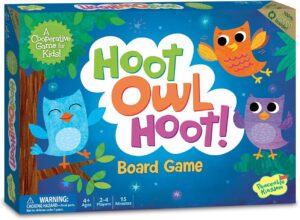
Hoot Owl Hoot! is a cooperative board game that’s perfect for children who find losing difficult. In this game, players work together to help a group of owls return to their nest before sunrise. The game is designed to foster teamwork and communication, with a shared goal of getting all the owls safely home. The absence of a competitive aspect reduces the stress of losing, as children either succeed as a team or face a shared challenge. It’s an excellent choice for teaching kids the value of cooperation and support.
The game also offers different difficulty levels, allowing children to gradually increase the challenge as they become more comfortable with the gameplay. This ensures that the game remains engaging and adaptable for kids of various ages and skill levels.
2. My First Orchard (Erster Obstgarten):
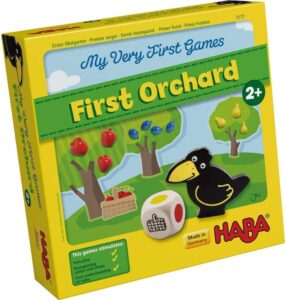
My First Orchard is a cooperative board game designed specifically for very young children. In the game, players work together to harvest fruit before a raven can steal it. This simple, colorfully illustrated game is an excellent choice for kids who may struggle with losing, as there’s no individual competition involved. The focus is on cooperation and completing the task as a team. The game’s mechanics are easy to grasp, making it suitable for preschoolers, and the absence of a winner or loser ensures that all children enjoy the game without the fear of defeat.
My First Orchard promotes important early skills such as turn-taking, fine motor coordination, and collaboration, all while providing a fun and stress-free gaming experience. It’s a fantastic introduction to the world of board games and can help young children develop social and cognitive skills
3. Outfoxed!:
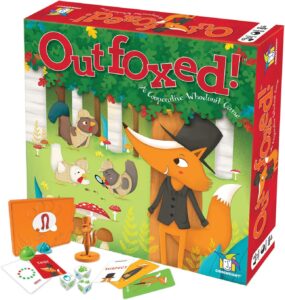
Outfoxed! is a cooperative deduction game that’s perfect for kids who have trouble with losing. In this game, players work together to solve the mystery of who stole Mrs. Plumpert’s prized pot pie. It combines deductive reasoning and memory skills in a non-competitive environment. The shared objective and teamwork aspect of the game help kids feel like they are part of a group effort, and the lack of a direct winner or loser makes it a great choice for children who find traditional competitive games distressing.
Outfoxed! promotes critical thinking and communication, and the suspense of solving the mystery adds to the excitement.The game also features a unique mechanism where a thief character is determined through clues, making it an engaging and enjoyable way to introduce cooperative play without the pressure of losing.
4. Mole Rats in Space:
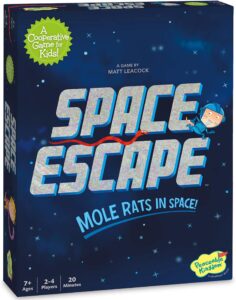
Mole Rats in Space is another excellent cooperative board game designed with kids in mind. In this game, players assume the roles of mole rats trying to complete a space mission while avoiding snakes on their spaceship. The game’s cooperative nature encourages children to work together, plan strategies, and problem-solve as a team. If they win, they all win, creating a sense of shared achievement. The game incorporates elements of risk and decision-making, which can help kids build resilience in a safe and supportive environment.
Mole Rats in Space is designed to be engaging for children while teaching important life skills like teamwork, logical thinking, and adaptability. The absence of a competitive element ensures that kids can enjoy the experience without the fear of losing, allowing them to focus on the thrill of the mission and shared adventures.
Competitive Games
1. Sushi Go!:
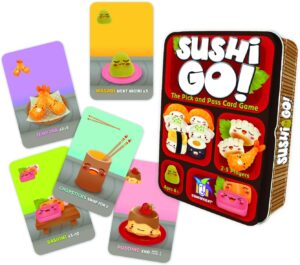
Sushi Go! is a delightful card drafting game that offers a perfect balance between competition and light-hearted fun. In this game, players collect sushi dishes to create their own meal combinations, aiming to earn the most points. The key here is that every player is working toward their goal without directly competing or taking away from each other. Kids who struggle with losing can appreciate that the game is less about beating others and more about making clever choices. It allows them to focus on their strategy and enjoy the process of creating a unique sushi feast.
The game’s adorable sushi-themed artwork and straightforward rules make it accessible to a wide age range, making it an excellent choice for family gatherings. Sushi Go! offers quick, engaging rounds, ensuring that even if they don’t win, children can dive right back in for another chance to create their sushi masterpiece.
2. Ticket to Ride: First Journey:
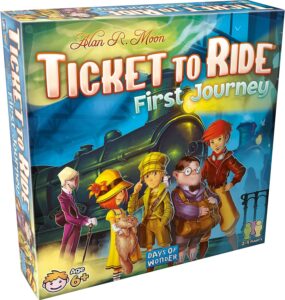
Ticket to Ride: First Journey is a simplified version of the popular board game Ticket to Ride, designed specifically for younger players. It provides a fantastic introduction to the world of strategy and competition without overwhelming children. In this game, players collect train cards and place them on the board to complete railway routes and earn points. While it’s competitive, the game offers a more relaxed experience compared to the original version, making it suitable for kids who struggle with losing.
The game’s colorful board and straightforward rules make it accessible and engaging for children, and it encourages them to plan their routes and make strategic decisions. With Ticket to Ride: First Journey, kids can enjoy the thrill of building their railroads and experiencing the satisfaction of completing routes, even if they don’t come out on top. It’s a great way to introduce them to strategy games while keeping the focus on the journey rather than the destination.